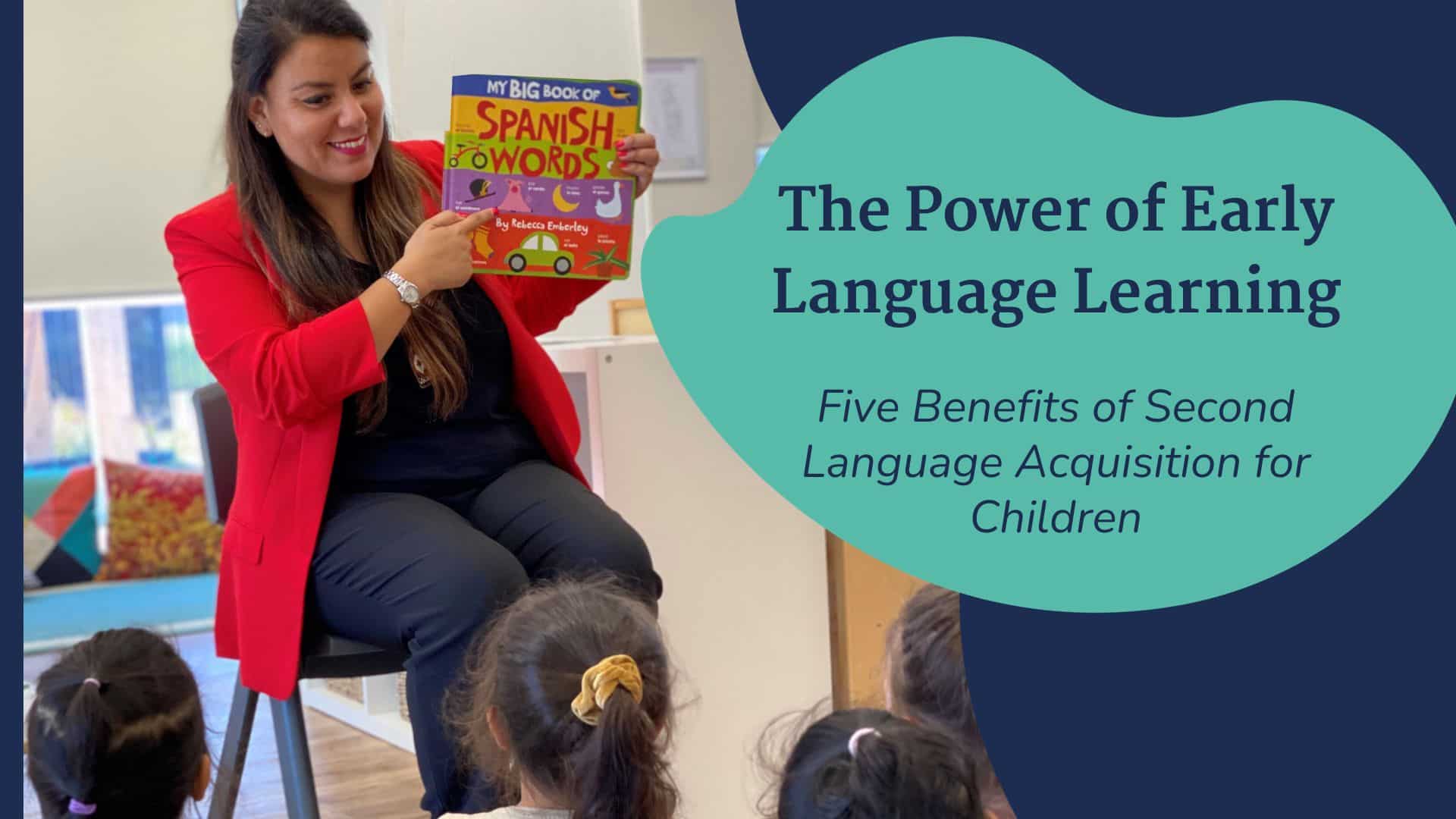Five Benefits of Second Language Acquisition for Children

Research consistently shows that learning a second language from an early age brings a myriad of benefits to children, especially in Australia, where English is not the first language of many families. (21% of Australians speak a language other than English at home (ABS, 2017). In early learning settings, many children are exposed to a rich cultural and linguistic diversity, either from other children or their educators.
Beyond the obvious advantage of bilingualism, early language acquisition enhances cognitive development, fosters cultural appreciation, improves academic performance, and opens doors to exciting career opportunities. At Niño Early Learning Adventures, the children learn Spanish, the second most spoken language in the world, exposing them to all the diverse and rich benefits.
In this blog, we will explore these advantages in detail, emphasising the lifelong impact of learning a second language at a young age.
Benefits of a Second Language for Children
- Enhanced Language Acquisition
Children have an innate capacity to absorb new information, making their brains highly receptive to language learning. Starting early allows them to develop native-like pronunciation, intonation, and fluency. The brain’s neural pathways for language acquisition are more flexible during early childhood, enabling children to effortlessly grasp grammar structures and vocabulary. By immersing themselves in a second language environment, whether through exposure to native speakers or attending bilingual schools, children become proficient communicators, equipped with a lifelong skill that opens doors to global connections. - Improved Cognitive Skills
The benefits of early language learning extend beyond linguistic proficiency. Numerous studies suggest that bilingual children demonstrate enhanced cognitive abilities compared to their monolingual counterparts. Learning a second language requires mental flexibility, problem-solving, and multitasking skills. Bilingual children often exhibit greater creativity, critical thinking, and adaptability. Moreover, language learning exercises the brain, leading to improved memory, attention, and overall cognitive development. These skills transfer to other areas of academic achievement, providing children with a strong foundation for success in various subjects. - Cultural Awareness and Appreciation
Language and culture are intimately connected, and early language learning fosters a sense of cultural awareness and appreciation. When children learn a second language, they also gain exposure to different customs, traditions, and perspectives. This early exposure promotes empathy, tolerance, and an understanding of diversity. Bilingual children develop a global mindset, enabling them to navigate multicultural environments with ease and respect. They are more likely to appreciate and celebrate different cultures, ultimately contributing to a more inclusive society. - Enhanced Academic Performance
The benefits of early language learning extend beyond language skills. Bilingual children often exhibit higher academic performance overall. Learning a second language improves reading comprehension, writing skills, and analytical thinking. It also enhances metalinguistic awareness, enabling children to understand the structure and function of languages more effectively. These skills transfer to their first language, resulting in stronger literacy skills. Additionally, bilingualism boosts problem-solving abilities and memory retention, providing children with an edge in various subjects. By starting early, children gain more time to refine their language skills, positioning themselves for academic success throughout their educational journey. - Increased Career Opportunities
In a globally interconnected world, proficiency in multiple languages is highly valued. Early language learning gives children a head start in their future career prospects. Bilingual individuals have a broader range of career opportunities, especially in fields such as international business, diplomacy, translation, and tourism. Learning a second language from an early age provides ample time for children to attain a high level of fluency and cultural competency. These language skills, combined with other personal and professional attributes, enhance employability and open doors to exciting global career prospects.
- Enhanced Language Acquisition
Children have an innate capacity to absorb new information, making their brains highly receptive to language learning. Starting early allows them to develop native-like pronunciation, intonation, and fluency. The brain’s neural pathways for language acquisition are more flexible during early childhood, enabling children to effortlessly grasp grammar structures and vocabulary. By immersing themselves in a second language environment, whether through exposure to native speakers or attending bilingual schools, children become proficient communicators, equipped with a lifelong skill that opens doors to global connections. - Improved Cognitive Skills
The benefits of early language learning extend beyond linguistic proficiency. Numerous studies suggest that bilingual children demonstrate enhanced cognitive abilities compared to their monolingual counterparts. Learning a second language requires mental flexibility, problem-solving, and multitasking skills. Bilingual children often exhibit greater creativity, critical thinking, and adaptability. Moreover, language learning exercises the brain, leading to improved memory, attention, and overall cognitive development. These skills transfer to other areas of academic achievement, providing children with a strong foundation for success in various subjects. - Cultural Awareness and Appreciation
Language and culture are intimately connected, and early language learning fosters a sense of cultural awareness and appreciation. When children learn a second language, they also gain exposure to different customs, traditions, and perspectives. This early exposure promotes empathy, tolerance, and an understanding of diversity. Bilingual children develop a global mindset, enabling them to navigate multicultural environments with ease and respect. They are more likely to appreciate and celebrate different cultures, ultimately contributing to a more inclusive society. - Enhanced Academic Performance
The benefits of early language learning extend beyond language skills. Bilingual children often exhibit higher academic performance overall. Learning a second language improves reading comprehension, writing skills, and analytical thinking. It also enhances metalinguistic awareness, enabling children to understand the structure and function of languages more effectively. These skills transfer to their first language, resulting in stronger literacy skills. Additionally, bilingualism boosts problem-solving abilities and memory retention, providing children with an edge in various subjects. By starting early, children gain more time to refine their language skills, positioning themselves for academic success throughout their educational journey. - Increased Career Opportunities
In a globally interconnected world, proficiency in multiple languages is highly valued. Early language learning gives children a head start in their future career prospects. Bilingual individuals have a broader range of career opportunities, especially in fields such as international business, diplomacy, translation, and tourism. Learning a second language from an early age provides ample time for children to attain a high level of fluency and cultural competency. These language skills, combined with other personal and professional attributes, enhance employability and open doors to exciting global career prospects.
The advantages of learning a second language from an early age are undeniable. Beyond the practical benefits of bilingualism, children experience cognitive, cultural, and academic advantages that stay with them throughout their lives. Early language learning is an investment in their future, equipping them with valuable skills, fostering appreciation for diversity and empowering them to succeed in an increasingly interconnected world.
Spanish Lessons at Niño ELA
At Niño Early Learning Adventures, we hold weekly Spanish lessons for our 3 and 4-year-old children, introducing them to the beauty and diversity of the Spanish language and culture.
Spanish holds a special place as one of the top five most widely spoken languages in the world, with its global significance evident from its presence across more than 20 countries where it serves as an official language. This widespread use allows our little niños to connect with a diverse range of cultures and people.
To find out more about our Spanish enhancement program, contact your local Niño ELA centre today.


